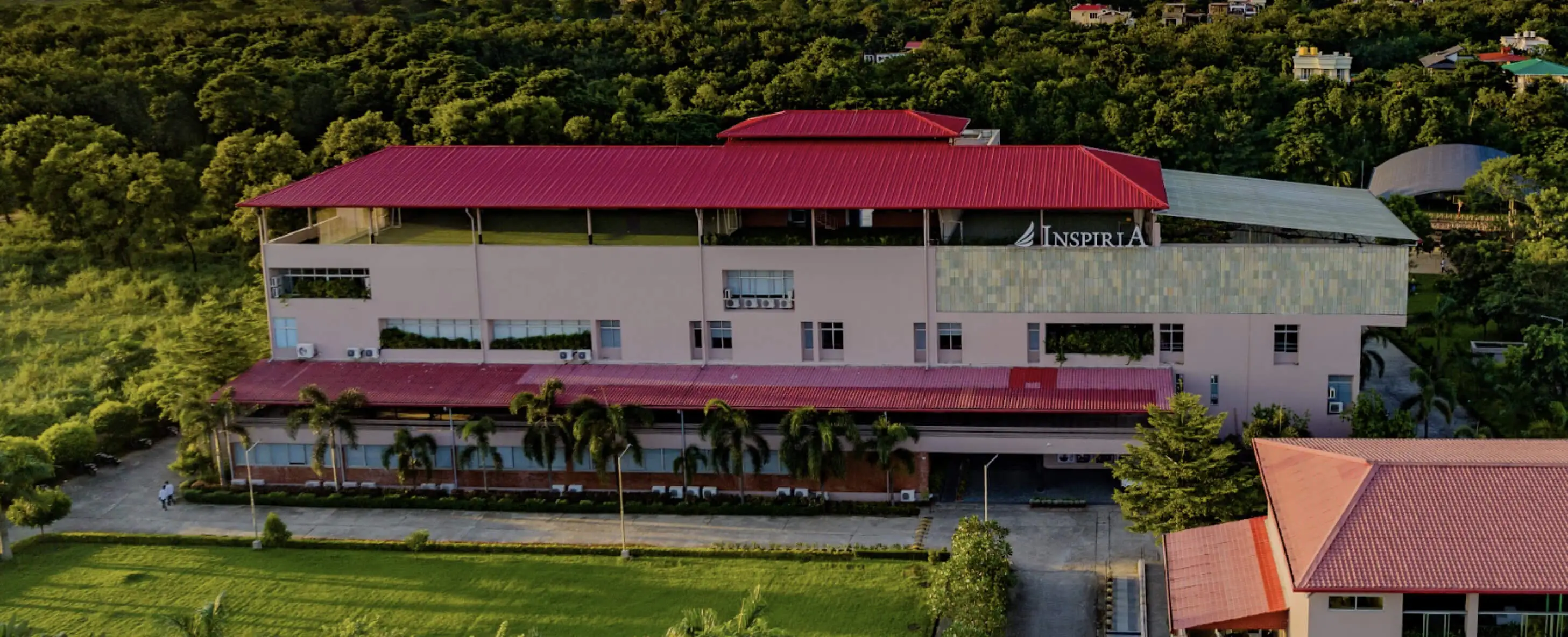Inspiria’s initiative towards promoting a healthy environment!
In a world where health and well-being take center stage, understanding the intricacies of nutrition becomes essential. Nutrition forms the foundation of a healthy lifestyle, influencing both our physical and mental well-being. The seminar aimed to uncover the mysteries of nutrition, emphasizing its fundamental principles and its role in sustaining a healthy lifestyle. It provided valuable insights into the importance of nutrition for overall well-being. Further, we’ll delve into the BBA in Hospital Management program, exploring its scope, career options, and future outlook. We’ll discuss the opportunities available and the potential for growth in this field. Stay tuned to learn more about this dynamic field!
What is Nutrition ?
The word ‘Nutrition’ is very important in our life. Nutrition involves consuming food to fuel our bodies and provide essential nutrients for life. Without proper nutrition, we cannot sustain and lead fulfilling lives.
The saying, “what we consume is what we become,” emphasizes the importance of maintaining a balanced diet for our health. Taking care of our diet ensures both mental and physical well-being, contributing to our overall development.
Health Seminar by Ms. Anita Shah (Nutritionist)

Inspiria Knowledge Campus’ Health Club under the department of BBA Hospital Management, organized a Health Seminar. The seminar was organized in collaboration with Medica Hospital. The coordinators of the event were Asst. Prof. Mr. Suresh Kumar Manoharan, Asst. Professor Ms Alpha Bhowmick, Asst. Prof. Ms Dipanwita Sikdar and Asst. Prof. Dr. Anil Raj Chettri.
Highlights of the event

The day commenced with the ceremonial lighting of the oil lamp, setting the tone for a memorable and impactful event. Our esteemed hosts and anchors welcomed attendees with warmth and enthusiasm, initiating a day dedicated to health and wellness.
Dr. Indrajeet Chatterjee, the respected principal, and HOD Sherry George felicitated our guest speakers, including the distinguished Dr. Anita Shah, a renowned dietician. Dr. Shah emphasized the importance of nutrition in our daily lives during her enlightening talk. She highlighted how nutrition promotes overall health and well-being.
The nutrition-based seminar aimed to empower individuals with the knowledge and skills needed to make informed dietary choices. Participants learned about the basics of nutrition and how to customize diet plans according to individual requirements. They also understood the importance of nutrition in preventing diseases. Dr. Sha’s expertise showed the way to a healthier lifestyle, empowering individuals to take control of their well-being. Her insights inspired people to become architects of their own health.
Health Camp

A basic health checkup camp, in collaboration with MEDICA Hospitals-Siliguri, reinforced the college’s commitment to promoting a healthy campus environment. More than 200 students, faculty, and staff took part in the camp. They recieved essential health assessments such as blood pressure, blood glucose, and oxygen saturation checks. They made use of these vital health services to ensure their well-being. Individuals received personalized dietary advice and early identification of health issues, enabling prompt intervention and treatment.

The resounding success of the Health Checkup Camp echoed Inspiria College’s dedication to holistic well-being. By providing easy access to comprehensive health screenings, expert consultations, and educational workshops, the event fostered a culture of well-being that transcends the college walls. Such initiatives prioritize individual health and contribute to a healthier and more informed campus community.

Inspiria remains committed to nurturing healthier individuals and promoting wellness in every aspect of campus life. Through collaborative efforts and proactive initiatives, we continue to pave the way towards a brighter, healthier future for all.
Health Tips for the Community
The event also offered valuable health tips, stressing the significance of maintaining a balanced diet and adopting healthy lifestyle habits. It served as a platform to share important insights on promoting well-being through nutritious eating and positive lifestyle choices. From dietary recommendations to cultivating positive habits like exercise, socializing, and pursuing interests, the tips aimed to inspire individuals to prioritize their physical and mental well-being. Some of those tips are:
Balanced Diet
Balance is a key factor in the success of any training goal, whether it’s building muscle, losing fat, or improving athletic performance. A balanced diet provides essential vitamins, minerals, and nutrients to keep your body and mind strong and healthy. A balanced diet provides the body with the proper proportions of carbohydrates, fats, proteins, vitamins, minerals, and water.
Do’s of Balance Diet
- Eat three meals a day, with two snacks between meals.
- Drink plenty of water especially during winter.
- Eat 5 servings of fruits and vegetables daily.
- Eat more raw foods such as salads, fruit, and vegetable juices, and focus on enjoying healthy foods rather than calories.
- Add Nuts in your regular diet- Groundnut is affordable and easily available for every individual
- Green Leafy vegetables for all pregnant mothers in remote India (Roti can be made mixed with green leafy vegetables) to improve iron content in their blood.
- Small fish with small bones to be consumed for Lactating mothers and drink at least 8 glasses of water/day.
A note about seafood: The Food and Drug Administration (FDA) recommends that Nursing/Lactating mothers not eat shark, swordfish, king mackerel or tilefish because of their high mercury content.
Don’ts of a balanced diet
- Do not skip meals especially breakfast
- Do not eat excessively.
- Do not eat out more than once a week
- Do not force yourself to eat just because it is good for you.
- Do not add alcohol in your regular meal plan
Wake Up Early
Most people are unable to indulge in exercise, have breakfast and spend few quality moments with their loved ones in the morning because they do not wake up on time. Make it a habit to wake up early each morning so that you have enough time to accommodate all these tasks.
Exercise
Squeeze in at least half an hour each day to indulge in physical exercise of your choice. You can choose to go for a walk, swim, practice yoga, deep breathing or do anything that interests you. This helps in de-stressing.
Connect With Positive Minds
It is always good to be friends with people who bring positivity in your life and stay away from those who indulge in negative talks. Also socialize with those who follow a healthy lifestyle rather than those who regularly indulge in unhealthy habits such as smoking or drinking.
Follow Your Interest
Most of us are so engrossed in our work these days that we forget to take out time to follow our interests and hobbies. It is a good idea to squeeze in some time to follow your hobbies such as gardening, reading, writing or anything of your choice. These act as a good replacement for the unhealthy habits and also help in keeping stress at bay.
You must make an effort to deliberately inculcate these healthy habits in your daily routine to attain good physical and mental health.
Understanding the world of Hospital Management
Hospital management refers to the administration, coordination, and oversight of the operations and resources within a hospital or healthcare facility. It involves the strategic planning, organization, and execution of various functions to ensure the efficient and effective delivery of healthcare services while maintaining high standards of patient care.
Key aspects of Hospital Management:
The world of hospital management encompasses a vast array of responsibilities and challenges aimed at efficiently running healthcare facilities while ensuring quality patient care. Here are some key aspects of hospital management:
Administrative Functions
Hospital administrators are responsible for overseeing the day-to-day operations of the facility. This includes staffing, scheduling, budgeting, and resource allocation.
Financial Management
Hospital managers must manage the financial aspects of the institution, including budgeting, revenue generation, billing, and reimbursement processes. They need to ensure financial sustainability while optimizing resources to meet the needs of patients and staff.
Human Resources Management
Hospital administrators oversee the recruitment, training, and retention of staff members, including doctors, nurses, technicians, and administrative personnel. They are responsible for creating a positive work environment and ensuring compliance with labor laws and regulations.
Patient Care Management
Hospital managers are responsible for ensuring that patients receive timely and appropriate care. This includes implementing quality improvement initiatives, optimizing care delivery processes, and maintaining compliance with clinical standards and regulations.
Information Technology Management
Hospital administrators oversee the implementation and maintenance of information technology systems, including electronic health records (EHRs), patient scheduling systems, and billing software. They ensure that these systems are secure, reliable, and compliant with privacy regulations.
Regulatory Compliance
Hospital administrators must ensure that the facility complies with various regulatory requirements, including healthcare laws, accreditation standards, and patient safety guidelines. This may involve developing policies and procedures, conducting audits, and implementing corrective actions as needed.
Risk Management
Hospital managers identify and mitigate risks that could impact patient safety, financial stability, or legal compliance. This includes assessing potential hazards, implementing preventive measures, and developing contingency plans for emergencies.
Overall, hospital management is a multifaceted discipline that requires strong leadership, communication, and organizational skills. Effective hospital managers strive to balance the needs of patients, staff, and stakeholders while navigating the complexities of the healthcare industry. If you want to step into this world, pursuing a Hospital Management course is the best choice for you!
BBA in Hospital Management
BBA Hospital Management programs are designed to equip students with the necessary skills and knowledge to excel in the field of hospital management. These programs delve deep into the details of hospital administration, covering various aspects such as healthcare operations, financial management, human resource management, and strategic planning. The curriculum of hospital management courses typically includes both theoretical learning and practical training, ensuring that students gain a comprehensive understanding of the healthcare industry’s nuances.
Graduates of hospital management courses are well-prepared to take on administrative and managerial roles within hospitals and other healthcare organizations, contributing effectively to the delivery of quality patient care and efficient hospital operations. The demand for professionals with expertise in hospital management continues to rise, making BBA Hospital Management programs increasingly popular among students aspiring to pursue careers in healthcare administration.
Institutions offering BBA programs for hospital management courses recognize the importance of providing students with relevant and up-to-date knowledge and skills that are essential for success in this field. With a focus on experiential learning, these programs often incorporate internships, industry projects, and guest lectures by industry experts to give students real-world exposure and practical insights into the challenges and opportunities of hospital management. Graduates emerge from these programs well-equipped to make meaningful contributions to the ever-evolving healthcare landscape.
Curriculum Overview
Although the curriculum for BBA in Hospital Management may be different in different colleges, here is a general outline of the four year BBA Hospital Management course:
Semester I and Semester II
| Semester I | Semester II |
| Hospital Operations Management & Planning | Medical Terminologies |
| Accounts | Medical records |
| Principles Of Management | Organization Behaviour |
| English & Professional Communication and soft skill | Any anyone from GE basket B/E |
| Life skills & personality Development | Modern Indian Languages and Literature |
| Yoga/Health & wellness /sports | IT Skills |
| Critical thinking/ NSS/ mental health/ environment studies |
Semester III and Semester IV
| Semester III | Semester IV |
| Medical Records II | Support utility services- I |
| HealthCare Marketing | Hospital Inventory & purchase management |
| Any one from Minor Basket | Environment & sustainable development |
| Any one from GE basket C/F | Any one from Minor Basket |
| Fundamentals of entrepreneurship | Indian Constitution and Society. |
| Understanding basics of cyber security |
Semester V and Semester VI
| Semester V | Semester VI |
| Support utility services- II | Quality in healthcare |
| Epidemiological transition in Healthcare | Public Health and healthcare Policy |
| Any one from Minor Basket | Occupational health and hazards |
| OBSERVATIONSHIP | Any one from Minor Basket |
Semester VII and Semester VIII
| Semester VII | Semester VIII |
| Healthcare Management Information System | Social and Behavioral sciences and basics of clinical psychology |
| Research methodology in Healthcare system | Health Economics |
| Health Insurance | Internship or research project |
| Any one from Minor Basket | Academic Project |
| Public Health Nutrition | |
| Evolution of AI application in Healthcare |
Why choose BBA Hospital Management after 12th?
Choosing a BBA in Hospital Management offers several advantages:
Healthcare Focus
BBA in Hospital Management provides specialized knowledge and skills tailored to the healthcare sector, offering a focused curriculum on healthcare administration, operations, and policies.
Growing Industry
The healthcare industry is expanding rapidly, creating numerous job opportunities for skilled professionals. Pursuing a BBA in Hospital Management allows students to enter a high-demand field with stable career prospects.
Meaningful Impact
Managing hospitals and healthcare facilities directly contributes to improving public health and well-being, providing a sense of fulfillment and purpose in one’s career.
Diverse Career Paths
Graduates of BBA in Hospital Management can pursue various career paths within healthcare administration, including hospital administration, healthcare consulting, pharmaceutical management, and healthcare policy analysis.
Practical Experience
Many programs offer internships, industry projects, and hands-on training opportunities, providing students with real-world experience and valuable skills applicable to their future careers.
Personal Interest
Individuals passionate about healthcare and making a difference in people’s lives may find BBA in Hospital Management more fulfilling and aligned with their interests compared to other management courses.
BBA Hospital Management at Inspiria Knowledge Campus

The BBA Hospital Management Department at Inspiria’s Knowledge Campus aims to educate students on the intricacies of managing healthcare facilities through the hospital management course. It’s open for both medical and non-medical students, offering them a comprehensive insight into hospital operations. With guidance from experts in hospital administration, students acquire essential skills for their professional journeys.
Inspiria also offers excellent placement opportunities for its students, ensuring a smooth transition into the workforce. Additionally, the campus hosts a student-run health club that organizes seminars and health check-up camps, providing students with practical, hands-on experience and knowledge.
Program Overview
Enhance Understanding: Improve understanding of healthcare management principles and rules for navigating the healthcare system effectively.
Cultivate Skills: Develop leadership, operational skills, and strategic thinking needed for success in healthcare management through hands-on learning and interactive coursework.
Prepare for Advanced Studies: Build a solid foundation for advanced studies and research in healthcare management, providing students with the tools to excel academically.
Comprehensive Understanding: Offer a thorough curriculum covering important management areas like HR, finance, operations, and marketing for a comprehensive grasp of healthcare management.
Admissions Criteria
To enroll in the BBA Hospital Management Program at Inspiria Knowledge Campus, Siliguri, candidates must have completed their 10+2 education from any recognized board, with English as one of the subjects.
Other Hospital Management colleges in Siliguri
Here are some other colleges in Siliguri for pursuing BBA in Hospital Management courses after 12th:
IIAS School of Management, Dagapur
The three-year BBA program in Hospital Management at IIAS School of Management prepares students for administrative, supervisory, and managerial roles in hospitals and the healthcare sector.
Students learn about managing finances, materials, and information systems in healthcare, as well as gaining skills in personnel management. IIAS has strong ties with top healthcare providers, offering students internships and masterclasses with industry experts. This practical approach makes IIAS a top choice for BBA in Hospital Management.
Siliguri Institute of Technology, Salbari
The Hospital Management Department at SIT is a new addition to the Institute’s Professional Studies. Since 2019, it has been offering a Bachelor’s Degree program in Hospital Management (BBA HM). The department aims to become a leading center for teaching, training, and research in Hospital Administration and Management.
Moreover, the BBA Hospital Management Department organizes various social welfare initiatives and collaborates with industries for activities like health check-up camps, awareness programs, community-based projects, and lifestyle management programs.
Scope of BBA Hospital Management
The scope of pursuing a BBA in Hospital Management is extensive and offers a wide range of career opportunities. Throughout this program, students acquire comprehensive knowledge of hospital administration, including areas such as economics, operations, and human resources. This program places a strong emphasis on practical training and education in the healthcare sector.
Career Prospects

Following are some of the career opportunities in this field:
Healthcare Analyst
Professionals in healthcare analysis gather, organize, analyze, and interpret data related to healthcare, including patient treatments and healthcare products. They conduct research, establish data organization and analysis systems, and prepare reports and other documentation.
Operations Supervisor
An operations supervisor oversees staff, handling tasks such as hiring, performance assessment, scheduling, work procedures, conflict resolution, and training. They identify training needs, organize, coordinate, and supervise day-to-day operations.
Healthcare Finance Manager
Managers in healthcare finance typically oversee the day-to-day financial operations of hospitals, clinics, physicians’ group practices, managed care organizations, or public health agencies. Their responsibilities may include contract reviews, financial reporting and analysis, budgeting, and salary evaluation.
Hospital Executive
The Hospital executives plan, direct, and coordinate day-to-day activities at the highest level of management, often with the assistance of assistant executives and staff managers.
Hospital Administrator
The Hospital administrators oversee the daily operations of hospitals, ensuring that departments run smoothly and efficiently. They work with the hospital’s management team to develop and implement strategies to improve patient care and increase profitability.
Health Services Manager
Health services managers oversee the delivery of healthcare services in hospitals or other healthcare facilities, working closely with healthcare professionals to ensure high-quality care and manage the facility’s budget.
Medical and Health Services Manager
These managers coordinate the delivery of healthcare services in hospitals or other facilities, working closely with healthcare professionals to ensure quality care and manage the facility’s budget.
Healthcare Consultant
Consultants provide advice and guidance to hospitals and other healthcare organizations, helping them develop and implement strategies to improve patient care, increase efficiency, and reduce costs.
Future Prospects
After completing a BBA in Hospital Management, individuals have various future prospects to consider.
MBA in hospital management
One option is to pursue further education by enrolling in an MBA program. An MBA with a specialization in healthcare management or administration can provide advanced knowledge and skills, opening up higher-level managerial positions in hospitals, healthcare organizations, or related industries.
Diploma in hospital management
Another option is to pursue a diploma or certification program in a specific area of hospital management, such as healthcare finance, human resources management, or healthcare informatics. These shorter, specialized programs can enhance one’s expertise in a particular aspect of hospital management and may lead to opportunities for career advancement or specialization within the healthcare field.
Overall, both an MBA and diploma/certification programs offer avenues for BBA graduates in Hospital Management to expand their knowledge, skills, and career opportunities within the healthcare industry.
Conclusion
In conclusion, pursuing a BBA in Hospital Management opens up a world of opportunities in the healthcare industry. With a comprehensive understanding of hospital administration and a focus on practical training, graduates are well-prepared for various roles in healthcare management.
Inspiria Knowledge Campus demonstrates its dedication to encouraging a healthy community through its recent health seminar and checkup camp. These initiatives prioritize physical and mental well-being.
Beyond campus walls, our commitment extends to equipping students with vital skills and knowledge through the BBA Hospital Management program. By focusing on understanding healthcare management principles and cultivating essential skills, we prepare students for successful careers in healthcare administration.
As we continue to promote wellness across all aspects of campus life, we encourage our community to embrace healthy habits for a brighter, healthier future.
Frequently Asked Questions
A: Yes, because the healthcare field offers many job opportunities in India.
A: It usually takes 3 to 4 years to complete.
A: Usually, you need to finish your 10+2 education with a certain minimum percentage in related subjects.








